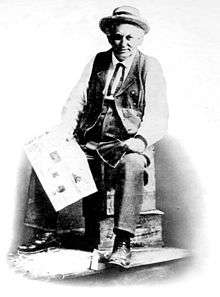Comedy album
A comedy album is an audio recording of comedic material from a comedian or group of comedians, usually performed either live or in a studio. Comedy albums may feature skits, humorous songs, and/or live recording of stand-up comedy performances, but the most common type of comedy albums are stand up, and are often made in conjunction with a DVD with recorded video of a particular comedy show.

Some of the earliest albums recorded for popular commercial distribution were comedy albums. For example, various collections of humorous short stories recited by Cal Stewart were released by Edison Records as early as 1898.[1]
A number of record labels specialize in the comedy genre, including AST Records, Comedy Central Records, Partee Records, Stand Up! Records, Stereolaffs and Celery Sound Records.
Comedy albums have won the Grammy Award for Best Spoken Word Album on several occasions, including America Again: Re-becoming The Greatness We Never Weren't, by Stephen Colbert (2014) and If You Ask Me (and of Course You Won't) by Betty White (2012). The first album to win this honor was The Best of the Stan Freberg Shows by Stan Freberg (1959), a variety album including comedy bits.
There is also a podcast that covers the history and influence of comedy albums, primarily on vinyl, titled Comedy on Vinyl, which also premiered a 50-year-old lost Bob Newhart track in 2015.
Recorded radio play
The Firesign Theatre, an improvisational surreal radio comedy troupe formed on Los Angeles KPFK FM on November 6, 1966, revolutionized the concept of the comedy album with the January 1968 release of a tightly-scripted album Waiting for the Electrician or Someone Like Him on Columbia Records. Side 1 consists of a trilogy of extended audio plays: "Temporarily Humboldt County" (9:14), which satirizes the Europeans' displacement of the indigenous peoples of the Americas; "W.C. Fields Forever" (7:39), which satirizes the 1960s hippie culture, and "Le Trente-Huit Cunegonde (Returned For Regrooving)" (7:19) which imagined a projected future in which the roles of the hippie counterculture and the Establishment culture have reversed roles. Side 2 (17:48) is the title track, a stream-of-consciousness play about an American tourist to an Eastern Bloc country, who ends up in prison and is rescued by the CIA. The Firesign Theatre produced fifteen albums designed for FM air play under two five-year recording contracts, and spawned an underground comedy cult. They won the Hugo Award for Best Dramatic Presentation by the World Science Fiction Society for two of their albums in 1971 and 1972. They continued recording on other labels as late as 2011, and three of their albums received nominations for Best Comedy Album Grammy in 1984, 1988, and 2001.
The Canadian comedy duo Cheech and Chong produced a series of similar underground comedy albums from 1971 until their breakup in 1985.
Further reading
- Christgau, Robert (March 11, 1973). "The Comedy Album Crop". Newsday. Retrieved June 7, 2018.
References
- Ronald L. Smith, Comedy on Record: The Complete Critical Discography (1988), p. 624.